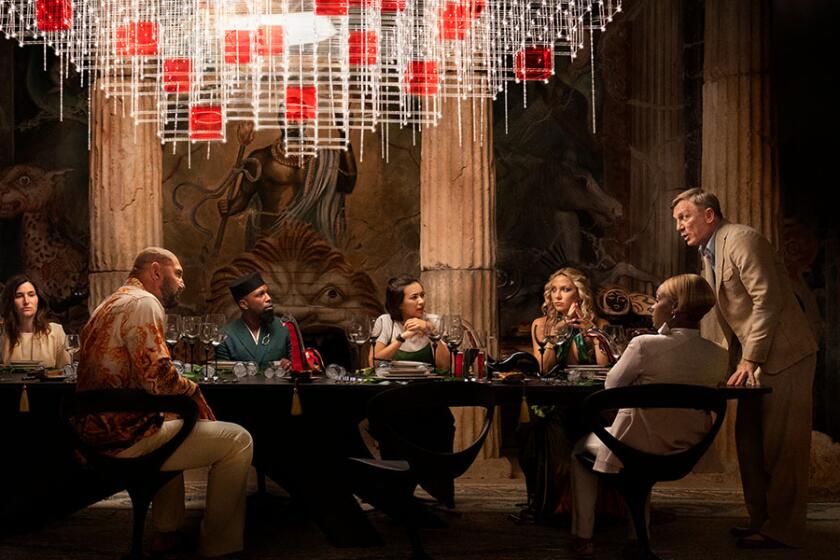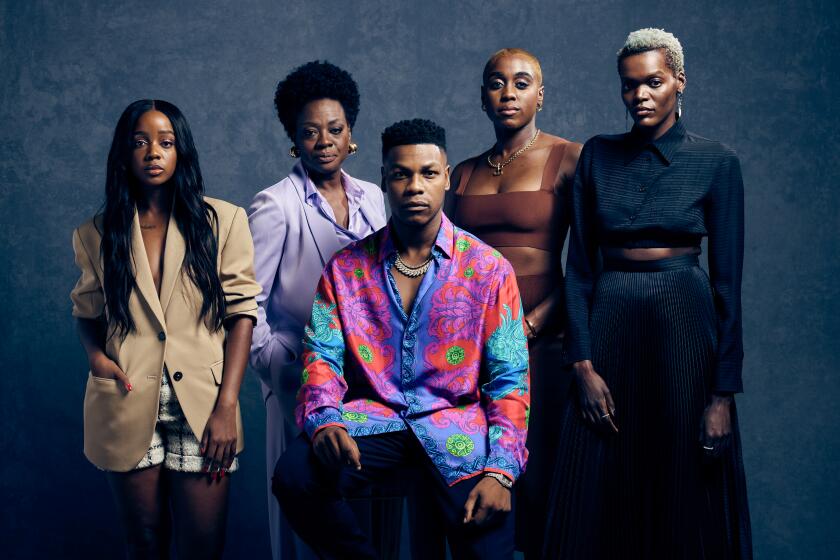Why making ‘Glass Onion’ scared Rian Johnson even more than ‘The Last Jedi’
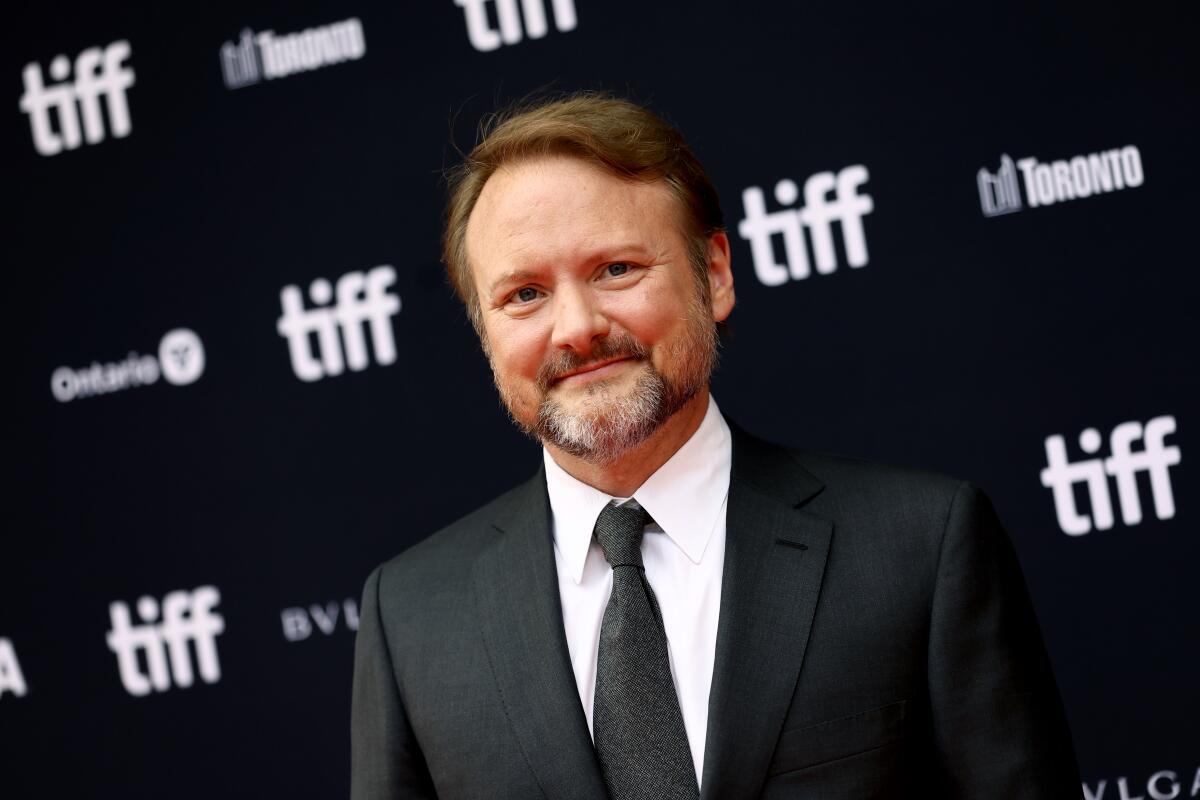
- Share via
One of the undisputed hits of this year’s Toronto International Film Festival has been writer-director Rian Johnson’s “Glass Onion: A Knives Out Mystery.”
Full of surprise cameos, with a story in which who gets killed is as much a part of the mystery and excitement as whodunit, the movie is the follow-up to Johnson’s 2019 “Knives Out,” which made more than $300 million worldwide and earned him an original screenplay Oscar nomination. Don’t worry: The film’s revelations will be kept safe here. What can be safely said about “Glass Onion” is that it involves a tech billionaire who invites a group of old friends and colleagues to his private island for a weekend murder mystery party, and that his plans quickly go off-course.
The cast includes Daniel Craig, returning as detective Benoit Blanc, along with new additions Edward Norton, Kate Hudson, Leslie Odom Jr., Kathryn Hahn, Dave Bautista, Jessica Henwick, Madelyn Cline and Janelle Monáe. Shot at a luxury resort in Greece, with soundstage work done in Belgrade, Serbia, the film’s exquisite attention to detail comes from longtime Johnson collaborators including cinematographer Steve Yedlin, editor Bob Ducsay, composer (and cousin) Nathan Johnson, “Star Wars: The Last Jedi” production designer Rick Heinrichs and “Knives Out” costume designer Jenny Eagan.
World premieres of films with Harry Styles, Viola Davis, Jennifer Lawrence and more top our picks for the 2022 Toronto International Film Festival.
As much as the movie draws from crime fiction, it also pulls from a wellspring of other cinematic references, such as Guy Hamilton’s 1982 “Evil Under the Sun,” starring Peter Ustinov as Agatha Christie’s detective Hercule Poirot, and Herbert Ross’ 1973 “The Last of Sheila.” (That film’s co-writer, Stephen Sondheim, has a brief cameo in “Glass Onion” filmed before his death in November 2021.)
“‘Last of Sheila’ is the cooler reference,” said Johnson, “but the reality is there’s probably a lot more of ‘Evil Under the Sun’ in this movie.”
The movie will begin streaming on Netflix on Dec. 23, with a theatrical release still to be announced (more on that below). The filmmaker sat down for a conversation the morning after the film’s raucous Saturday-night world premiere, where most of the cast was in attendance.
“The cast hadn’t seen the movie yet, and so for them to experience it for the first time with a crowd like that — it made me feel good that they felt really good,” Johnson said.
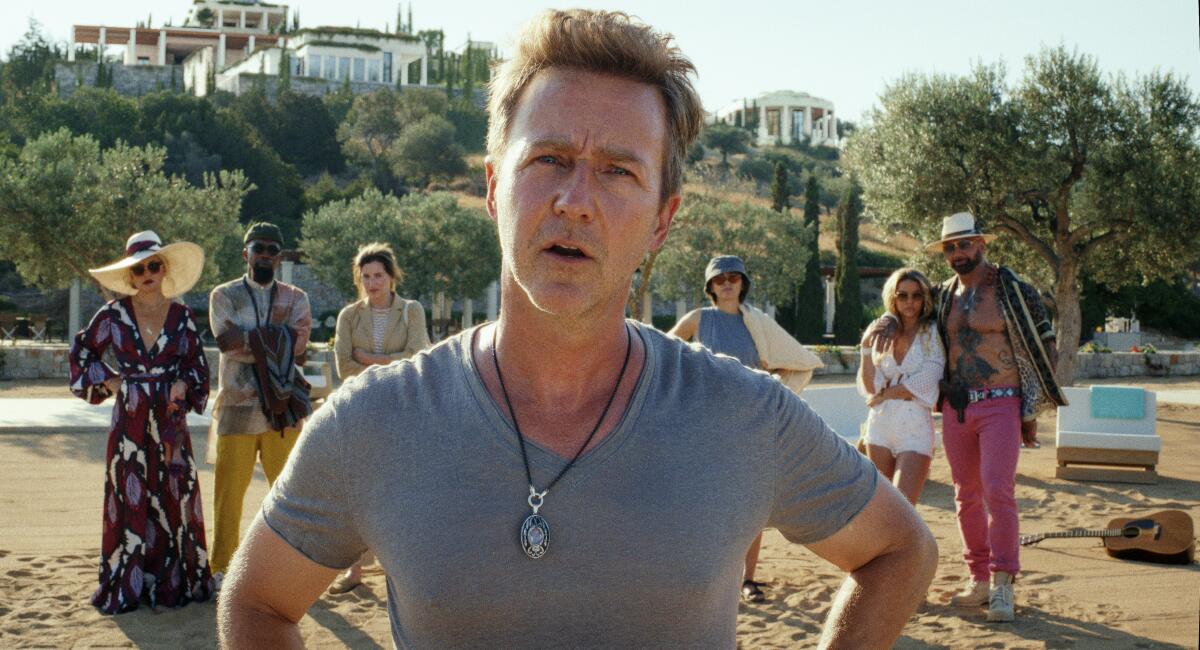
You obviously have some experience with writing a sequel from “Star Wars: The Last Jedi.” Did you approach this in the same way?
Rian Johnson: No, it’s a very different animal for a couple reasons. First of all, “Last Jedi” was actually a proper sequel, continuing the events from a movie that I didn’t write. With this, first of all, it’s not even really a sequel, it’s kind of like another book, basically another mystery with the same detective. If anything, going into it was a little scarier even than the “Star Wars” movie, because the first one, when we made it, it was in such a vacuum and we had no idea if people would be into this kind of thing. Genuinely, it was just something that I really loved, a genre I loved, and I’m like, “Let’s try this.”
And then the fact that people enjoyed it and the fact that it was popular — when you put something out there, this happens anyway, but especially, I think, in this case — it becomes something outside of you and you kind of forget how you made it. And so it was scary. I’ve never experienced nerves quite like actually sitting down to write something. I also spent 10 years planning “Knives Out,” whereas this, I was kind of starting from scratch.
The fact that this movie is so specifically set in 2020 in the early pandemic really emphasizes that both of the movies are set in our modern day. This isn’t a quaint, retro thing. Why is that important to you?
Johnson: I think this is the case with a lot of genre stuff, and in a way that was the same thing that kicked me off with my first film, “Brick,” reading Dashiell Hammett and feeling like I was getting kicked in the stomach by that prose and feeling like over time the idea of film noir had become sort of gilded, separated from that very immediate gut-punch reaction that you get from just those raw words. And wanting to do something that didn’t reinvent it but that got back to the vitality of it by shaking off the nostalgia that’s attached to it.
The way to do that with the whodunit is to just set it in modern-day America, to very brazenly engage with what’s going on right now with America. Not that these are incredibly nuanced message movies or commentaries at all. They’re big, popular entertainments, but part of it is not shying away from, “Yes, this is set right here and right now, and we’re gonna be talking about stuff we’re talking about right now.” That’s what Agatha Christie did back in the day. She wasn’t writing period pieces.
You seem to take particular pleasure in writing the character of Benoit Blanc. Why do you enjoy writing for that character so much?
Johnson: When I wrote the first one, I didn’t know who was going to play him. I really didn’t know what the character was going to be like, oddly. I started writing, and I think I had it in my head, “Let’s create a new, iconic Poirot.” And I manufactured all these quirks, and it got terrible. And so I finally just cleaned it all out and said, “I’m just going to write this guy to his purpose in the script and give him a Southern accent and we’ll get a great actor in there, and then it’ll kind of define itself as we make it.”
I heard Daniel talking about how he had to almost relearn the accent because he didn’t want to do a caricature of it. So he kind of started from scratch, and I sort of had to do the same thing with Blanc. I didn’t want to write a pastiche of what Blanc is in my head from now having seen the first film so many times. ... And this movie is much more from his perspective than the previous movie, which was also fun.
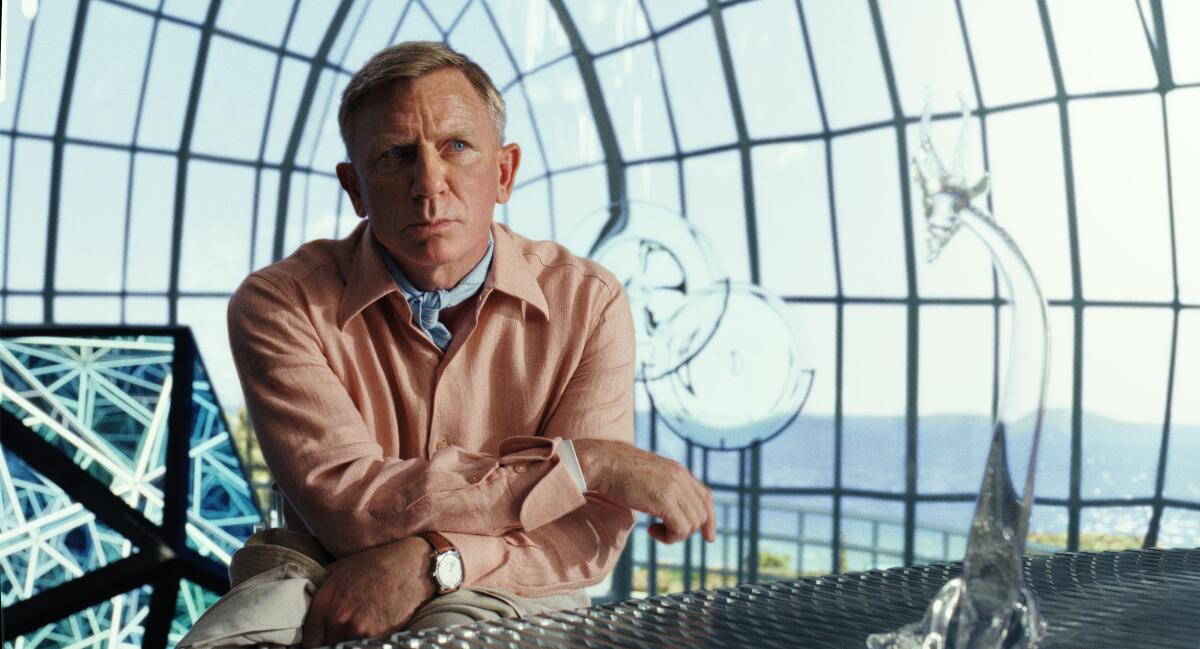
One thing I have come to appreciate and admire in your work is your willingness to be silly. You take what you do seriously, but you still can be playful and have fun with it. Where does that come from?
Johnson: I’m a deeply silly person. All my favorite filmmakers have a streak of silliness running through their stuff. Even filmmakers who make incredibly serious work sometimes, the Coen brothers or Kubrick — anyone whose work is worth a damn is not afraid of silliness. But particularly with this genre, because of my touchstones with it, the element of silliness to Poirot is essential to what makes that character tick. And also, by the way, using it as a narrative tool. Silliness is a way to disarm. For Blanc to disarm the other characters but also to disarm the audience. When you’re planting a thousand things and you’re trying to make them stick in the audience’s mind without realizing that it’s something that’s going to be important later, so it doesn’t stand out — if you can do that with a joke, [it] feels like the reason I’m telling this information is because there’s a punchline at the end. The reality is it’s going to pay off at the end of the movie. That’s incredibly helpful, just from a technical standpoint.
Your deal with Netflix was reported as being for two movies, and after the premiere your producer Ram Bergman confirmed that there will be a second movie. Are you already at work on that? Are you already writing?
Johnson: I’m not writing yet, but the gears are starting to turn. We’ll see what happens. I had initially thought, “Boy, I should probably go and do something else before I do the third one of these,” but I’ll tell you the truth, I’m just so creatively jazzed by the prospect of what the third one can be. And also the idea of doing a third one that really defines what this series can be, in terms of how the third one could be as different from this one as this one is from “Knives Out.” That can truly kind of prove this is something that can keep going for a while and not get stale.
Will you and “The White Lotus” be competing for luxury resorts around the world?
Johnson: That’s the fun thing for me, is there’s no reason the next one couldn’t suck back in and be a chamber piece again. That’s what Agatha Christie did. She would go big, she would go small. It wasn’t about the scale. It wasn’t about the scope or the setting. It was about finding a fun, unique narrative gambit each time and finding a new thing to talk about with each new story.
Scroll through images of some of the stars to visit the L.A. Times Photo Studio at the 2022 Toronto International Film Festival.
You said at the premiere that you see these very much as movies, and part of the fun of a movie for you is seeing it with a big crowd. Is that contradictory to Netflix’s strategy?
Johnson: I can’t speak to Netflix’s strategy, but it’s not contradictory to what I want with the release. I want as many people as possible to see this with a crowd. I also am very aware more people probably discovered [“Knives Out”] at home with their family than saw it in the theater the first time. ... We’re working on it. We’re figuring something out. But my goal is if you want to see this in the theater, you’ll be able to see it in the theater.
Since you made the deal with the company and since you’ve been working with them, has your perspective on windowing and what a theatrical release can look like changed at all? Have you learned anything from them?
Johnson: I feel like right now everybody is just running on top of the avalanche. Nobody knows s—. There’s lots of information that everybody has right now about what works and what doesn’t. And at the end of the day, I think what works is a good movie that people want to go see. I’m either pessimistic or optimistic depending [on] how you define it, where I just feel like the industry has been in a state of collapse since its inception. ... It just feels like it’s a constant state of affairs. It’s constantly reinventing and finding itself. I believe that the theatrical experience isn’t going anywhere, it is coming back. And I believe it’s a vital part of what makes movies, movies.
I spoke to you before the premiere of “Knives Out” here at Toronto, and at the time I asked you about the fact that the movie was premiering at the festival and opening in November. It was scheduled like an Oscar movie, and you laughed and were dismissive about that idea.
Johnson: Get ready for me to laugh again. History is repeating itself.
Then you were nominated for an Oscar, and now this movie has some expectations — even some of the press out of the premiere had to do with its awards chances. Do you feel any kind of pressure in that regard? Are your feelings different this time because of what happened with the previous movie?
Johnson: No, zero percent. It was an incredibly fantastic, amazing honor and surprise to get that nomination last time. But that’s not the prize that we have our eye on with these movies. We make these movies as popular entertainments. The only thing that we’re gunning for when we make these things is to give an audience a good time. I don’t think of these as awards movies.
More to Read
Only good movies
Get the Indie Focus newsletter, Mark Olsen's weekly guide to the world of cinema.
You may occasionally receive promotional content from the Los Angeles Times.
